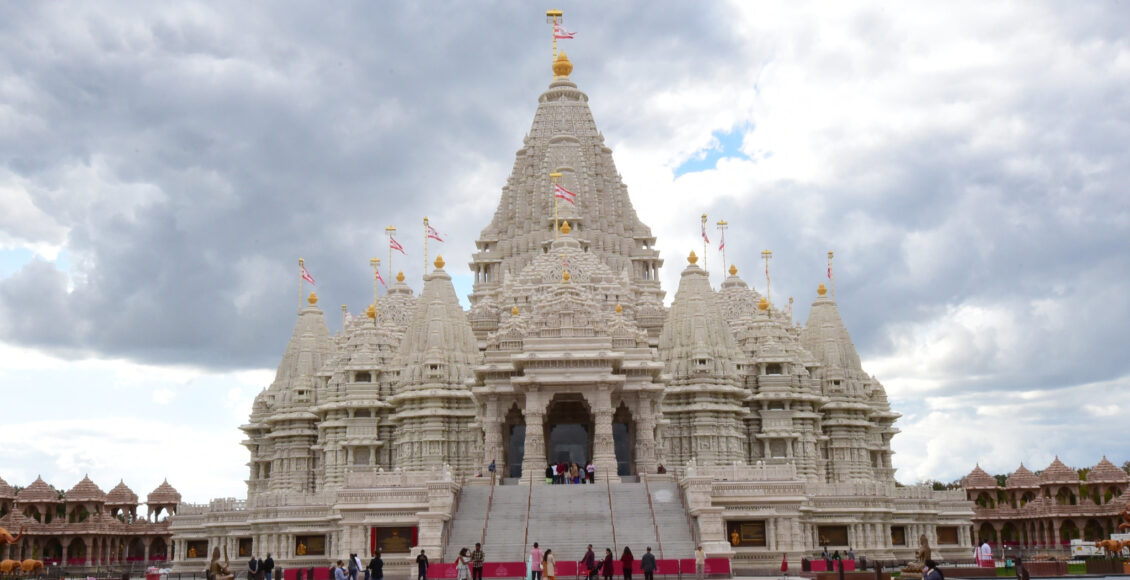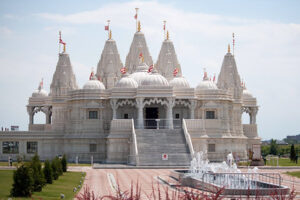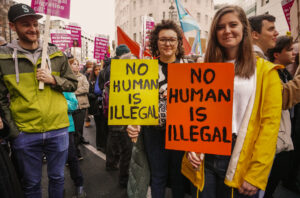Sacred Betrayal: Unveiling Labor Migrant Rights Abuses at North America’s Largest Hindu Temple

On May 11, 2021, the Federal Bureau of Investigation (FBI) raided a construction site in the small town of Robbinsville, New Jersey. Along with the FBI, the Department of Homeland Security and the Department of Labor were involved in an extensive investigation into labour conditions associated with the construction of the largest Hindu temple in North America. Bochasanwasi Akshar Purushottam Swaminarayan Sanstha, a Hindu organization whose activities range from building Hindu cultural centers to charity work, is alleged to have committed multiple labour and human rights cases of abuse. Alleged actions included the confiscation of passports and visas, 12-hour work days 7 days a week with little to no vacation, docked payment for workers leaving the property, rules barring communication with anyone not working on the site, and insufficient food provisions.

Two years ago, when the FBI entered the premises of the BAPS temple construction site, they found 200 workers who entered the country on nonimmigrant religious temporary residence visas, also known as R-1 visas. These visas were developed to allow migration to the United States to participate in religious duties. BAPS is alleged to have exploited the terms of R-1 visas by exhausting, abusing and underpaying workers since the beginning of the temple’s construction in 2017.
Unfortunately, this is not the first time there have been accounts of human rights abuses in relation to R-1 visa holders. Between 1994 and 2003, the Church of Scientology petitioned for dozens of foreigners to receive R-1 visas. Personal reports collected from victims who had worked in multiple Scientology religious centers around the country proved that human rights abuses enabled through R-1 visas are not an isolated issue. The Church of Scientology enlisted these people to “volunteer” in multiple temples around the country. An investigation done by The Intelligencer from New York Magazine found that these visa holders had their immigration documents confiscated and were forced to do manual labour such as cleaning religious buildings, construction work, and landscaping for 16 hours a day for almost no pay. They were unable to refuse assignments, and it was very difficult for them to leave their living quarters.
To get an R-1 visa in the United States, a religious organization must petition the US government for the arrival of overseas individuals. Organizations fill out an I-129 form which obtains permission for foreign nationals to live in the United States for a finite time to participate in religious activities. The I-129 form contains a required section where wages and work hours must be provided. The BAPS organization filled out the I-129 forms, saying that their workers were specialized artisans who were coming to the US to help hand paint and carve stones for the temple. According to accounts provided by workers, they completed hard manual labour that included moving heavy materials, operating machinery like cranes, clearing construction sites of snow, and digging earth for the placement of building structures. I-129 forms do not contain any minimum wage requirements for religious workers. The R-1 visas do not require religious organizations to pay the workers that they petition for, regardless of their working hours. BAPS released a public statement saying that their workers agreed to voluntary labour. However, since the painting and rock carving were not noted in the many reports of the jobs on the construction site, there is a substantial case to be made for fraudulent actions.

The R-1 abuses by BAPS and the Church of Scientology went unnoticed for a substantial amount of time for a few reasons. First, the R-1 visa is directly noncompliant with the Fair Labor Standards Act, which establishes minimum wage. This inconsistency has flown under the radar because of the extremely loose regulations over what type of work is permitted under an R-1 visa. The State Department provides that R-1 visas can be used to sponsor “any type of activity within their religious vocations, denomination, or its affiliate” without clarifying to what extent this definition can be applied. The provisions of the visa imply that this phrase means any work that is done underneath a religious or spiritual institution. It stops short of drawing the line between what kind of work should be allowed to go unpaid and which should not. Additionally, the petitioners of R-1 visas incur little oversight from immigration and customs offices in the United States. The approval process for R-1 visas does not use mechanisms to vet employers who petition migrant workers for their cause. Supervision over the activities of visa holders and the conditions that their petitioners are providing for them is nonexistent.
Indeed, a 2006 report from the Government Accountability Office explicitly identifies R-1 visa classification as having a high rate of fraud, reflecting on the decade of abuses of the visa by the Church of Scientology and the Gaudiya Vaisnava Society, whose leader was sentenced to 37 months in prison for R-1 visa fraud. Given these concerns, it is alarming that an R-1 visa is valid for five years – a substantial period of time, given that most temporary workers’ visas are only valid between 12 months to three years.
Recently, the United States Citizenship and Immigration Services (USCIS) concluded a 12-year study on the conduct of petitioners for R-1 visas and found that there was substantial noncompliance around the work that visa holders were reported to be doing versus what was going on at job sites. As of the time of writing, there have not been any significant efforts to reform the R-1 visa, nor has there been any substantive dialogue to introduce a new policy in light of the USCIS study.
The underlying problem observed in cases of R-1 visa violations is the common practice of dehumanizing migrant workers. Migrant workers are afforded little protection both from their own government and the state in which they are working. Migrant workers become just another pair of hands to build institutions and provide services to citizens ignorant of their struggles. R-1 visas are just one of the many loopholes that allow employers to abuse migrant workers regularly. These cases prove that life, liberty, and freedom are finite; not everyone who crosses American borders is afforded them.
Edited by Daniel Harris.
Featured Image: “BAPS Shri Swaminarayan Mandir in Robbinsville, NJ” by slgckgc is licensed under CC BY 2.0.
